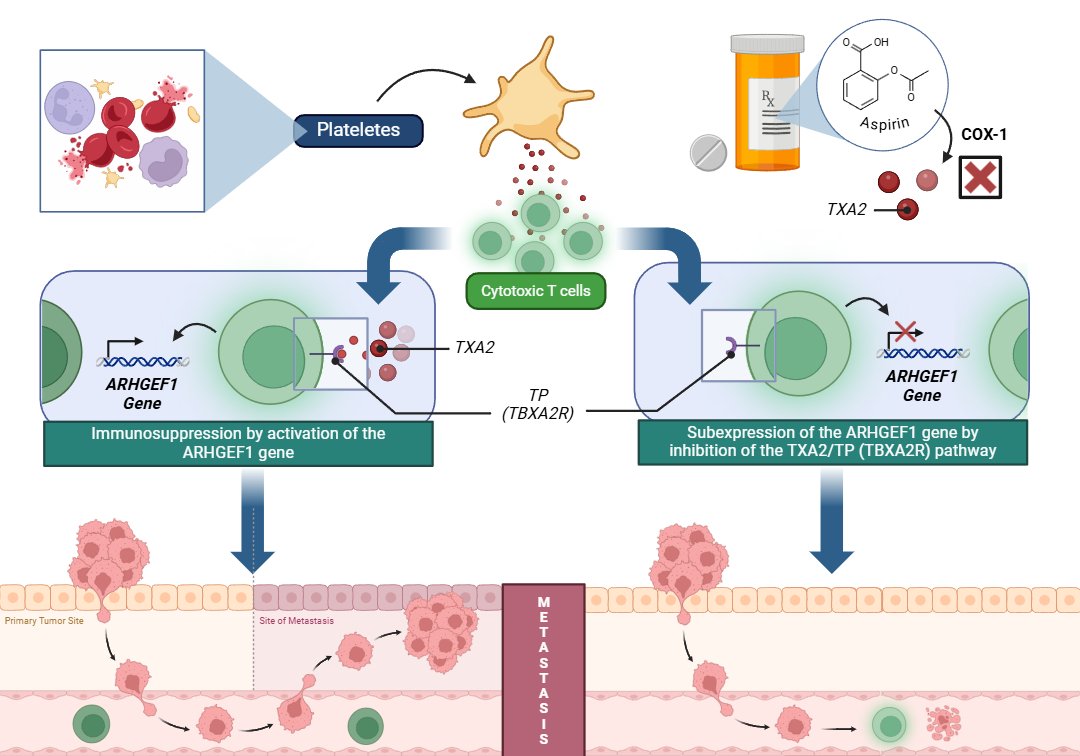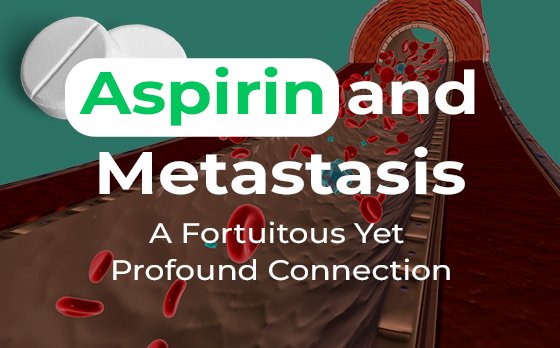Cancer is a complex disease that has driven science to explore new strategies to halt its spread. While multiple mechanisms enabling the dissemination of tumor cells have been identified, a recent study published in Nature by Cheng et al. (2024) has revealed an unexpected factor in this process: platelets and their ability to suppress the immune response. Even more surprising, researchers discovered that a common drug like aspirin could play a crucial role in reversing this phenomenon.
This finding emerged as scientists investigated metastasis, the cause of 90% of cancer-related deaths. It is known that individual tumor cells that detach from the primary tumor are more vulnerable to immune attack than established tumors, which have developed an immunosuppressive microenvironment. During their research, scientists identified that mice lacking the ARHGEF1 gene exhibited a significant reduction in metastases in organs such as the lungs and liver. They later discovered that TXA2 activates ARHGEF1 in T lymphocytes, inhibiting their ability to infiltrate tumors and allowing cancer to proliferate.
The surprising discovery was that this immune suppression was linked to a well-known physiological process: the production of thromboxane A2 (TXA2) by platelets. This led researchers to a crucial question: if TXA2 facilitates immune evasion, could this process be reversed by inhibiting it? The answer pointed them to aspirin, a widely used drug that has long been known to inhibit TXA2.
The study identified that TXA2, a pro-inflammatory molecule produced by platelets, directly suppresses T lymphocytes. In a tumor microenvironment where platelets are active, TXA2 production reduces the immune system’s ability to infiltrate and attack the tumor. Since cytotoxic T lymphocytes are essential for recognizing and destroying cancer cells, this process promotes tumor progression and resistance to conventional treatments.
Molecular Mechanism and Aspirin’s Action
TXA2 activates the TP (TBXA2R) receptor in T lymphocytes, triggering ARHGEF1 activation, which blocks their mobility and ability to infiltrate the tumor. This mechanism allows tumors to evade immune destruction and continue growing unchecked. However, aspirin blocks the enzyme cyclooxygenase-1 (COX-1), reducing TXA2 production and allowing T lymphocytes to regain their normal function. In cancer models analyzed in the study, aspirin administration led to greater T lymphocyte infiltration in tumors and reduced metastasis formation.
This discovery is significant because it opens the possibility of combining aspirin with more advanced therapeutic strategies, using a common drug to enhance the immune response against cancer.

Figure 1. Platelets suppress immune response by releasing TXA2, which activates ARHGEF1 in T cells, reducing their tumor infiltration. Aspirin inhibits COX-1, lowering TXA2 levels and restoring T cell function, potentially improving cancer treatment.
Dr. Jason Williams’ Perspective
Chapter 10 of The Immunotherapy Revolution by Dr. Jason Williams had already discussed how certain medications used for other conditions could improve cancer treatment. He notes that nonsteroidal anti-inflammatory drugs (NSAIDs) like aspirin inhibit the activity of cyclooxygenase-2 (COX-2), reducing the production of prostaglandin E2 (PGE2), another immunosuppressive molecule. Although the mechanism identified in the Nature study involves COX-1 and TXA2 rather than COX-2 and PGE2, both processes demonstrate how inflammation and coagulation impact tumor immunity.
In both cases, the goal is to convert a “cold” tumor microenvironment into a “hot” one, promoting T lymphocyte infiltration and improving the immune response against cancer. This is where immunotherapy becomes a key tool in oncology, as combining it with drugs that modulate inflammation and coagulation could significantly enhance its effectiveness.
This discovery reinforces the importance of understanding how the tumor microenvironment affects the immune response and how common drugs can optimize cancer treatments. While aspirin is accessible and well-known, its use in cancer patients should be carefully evaluated to avoid side effects such as gastrointestinal bleeding.
Both the research published in Nature and Dr. Jason Williams’ insights emphasize the need to explore new therapeutic combinations that enhance immunotherapy. As science advances, innovative strategies like aspirin use could transform cancer treatment and improve patient outcomes.
References:
Yang, J., Yamashita-Kanemaru, Y., Morris, B.I. et al. Aspirin prevents metastasis by limiting platelet TXA2 suppression of T cell immunity. Nature (2025). https://doi.org/10.1038/s41586-025-08626-7
Williams, J. (2019). The Immunotherapy Revolution: The Best New Hope for Saving Cancer Patients’ Lives. BenBella Books.


